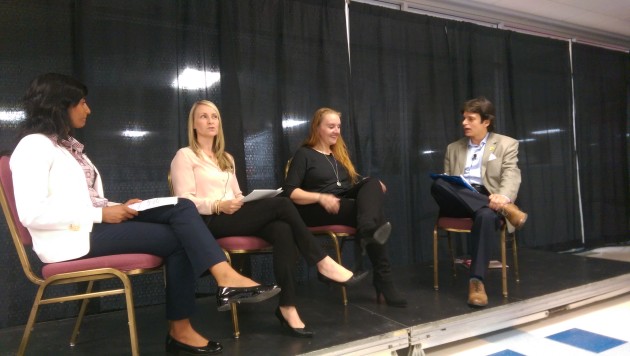Delivering on their promises
ABBOTSFORD, B.C. – Though women are starting to make up a higher proportion of trucking industry employees than ever before, the numbers remain very small in comparison to men, concurred a female panel of industry professionals at the B.C. Trucking Association’s (BCTA) Truxpo event May 13.
Hosted by Lou Smrylis, publisher and editorial director for Truck West and Truck News magazine, the three-woman panel comprised of Angena Kalhar, president of KTL Transport, Amy Richards, director of human resources at Trailer Wizards and Candy-Lyn Lemieux, a driver for Dolphin Transport who has been behind the wheel for nearly a decade.
Trucking HR Canada organized the event in an effort to bring some of the challenges and successes women have experienced breaking into and working in the trucking industry.
Lemieux said she was exposed to the world of trucking at an early age, as she used to help her stepfather, who was a heavy-duty mechanic, when she was a child, and later in life while attending college, she met a driver who she travelled with for about a year, and she knew was ‘bitten’ by the trucking bug.
Lemieux chronicled her arduous journey following through with her passion to drive a truck, which began with receiving a grant from the Earn Your Wheels program, but did not initially lead to her getting an offer to drive.
“Nobody wanted to hire a woman,” Lemieux said. “It was hard knocking on doors.”
Lemieux said she first worked on the docks before eventually landing a position with an owner-operator, who she said did not even compensate her for her services.
After ‘paying her dues’ with a second owner-operator, Lemieux began working with Dolphin Transport and has been driving ever since.
Lemieux admitted that being on the road for extended periods of time can be an emotionally challenging facet of the job, especially since she has a three-year-old daughter waiting for her at home.
Because her company does not employ forced dispatch, Lemieux said she does have some flexibility when it comes to her daughter, and she hopes that someday when her little one is older that she’ll have a better understanding of why she is so frequently away from home.
Kalhar, who is the president of her family business, said her varied work experiences helped create a broad spectrum of skills that have aided in her success in the trucking industry.
Kalhar attended college with a keen interest in photography, earning an arts degree, but she quickly reverted back to the family business.
“My true passion was in the family business,” she said, “but it took me doing something entirely different to realize that.”
For Kalhar, breaking some of the typical stereotypes woman face when entering the industry was the biggest challenge, and being a young, Indian woman, she said a major role reversal had to occur.
“I’m an Indian woman signing their paycheques,” Kalhar said, referring to her company’s drivers, where the vast majority of which are Indian men. “So that’s been a major challenge.”
Kalhar said one of the key aspects to finding success as a woman in the trucking industry is ensuring you have a solid understanding of what you are doing.
“You have to prove yourself,” she said. “You have to know the business and deliver what you’re promising.”
Richards said quality mentorship programs are key to enticing more women into the industry, and pointed to Lemieux as an example of someone who would have benefitted from such an experience.
Richards added that community outreach, including in schools, could help show women that there is an opportunity for them in trucking, as many can feel isolated in the male-dominated field and quickly leave in search of something else.
“It’s a challenge for everyone in the industry,” Richards said of recruiting and retaining women. “You have to change how you do things (and) show the value and strength of women in this industry.”
Richards said women bring something different to the table than men, as they are typically better communicating and connecting with others.
She also said women need to stop being so hard on themselves and understand that they can be successful in the world of trucking, and confidence was the key to achieving that success.
Despite revealing some of the challenges she has faced in the industry, such as derogatory comments and a general disbelief in her driving ability, Lemieux said women must ‘stick to their guns and don’t give up’ if they wanted to break into the industry.
She said she hoped that in the next 20 years there would be more female drivers entering the trucking industry, as there is a need for quality drivers and women could help fill that gap.
Kalhar said there has been a lot of progress in the last century for women in all industries, including trucking, while Richards added that although there have been positive moves, the numbers were still quite low – approximately 3% of the industry is made up of women – and more was needed to promote the trucking industry to woman.

Have your say
This is a moderated forum. Comments will no longer be published unless they are accompanied by a first and last name and a verifiable email address. (Today's Trucking will not publish or share the email address.) Profane language and content deemed to be libelous, racist, or threatening in nature will not be published under any circumstances.
My wife and I have had several female drivers. One thing stood out among them; if they said “yes” to a dispatch the job was as good as done. If they said “no” for any reason, that was the end of the conversation. We always knew where we stood.